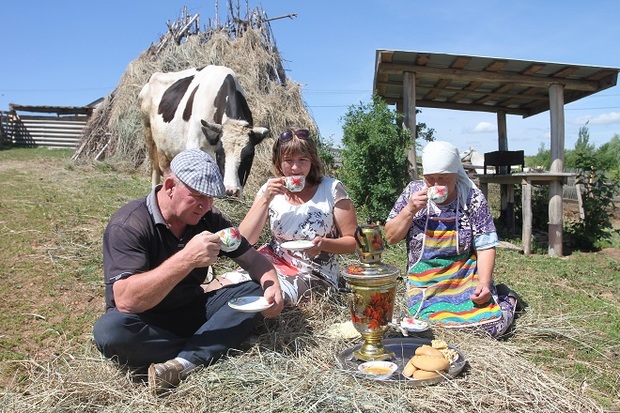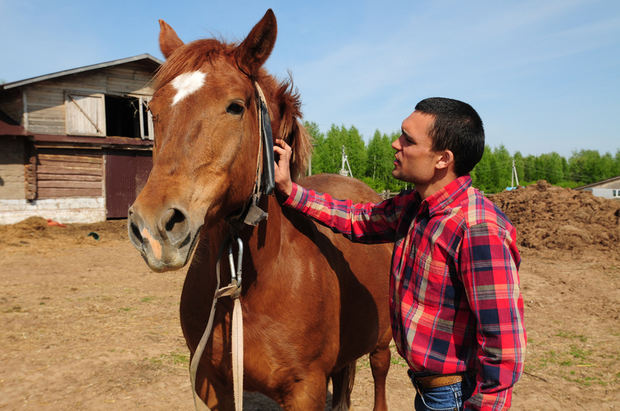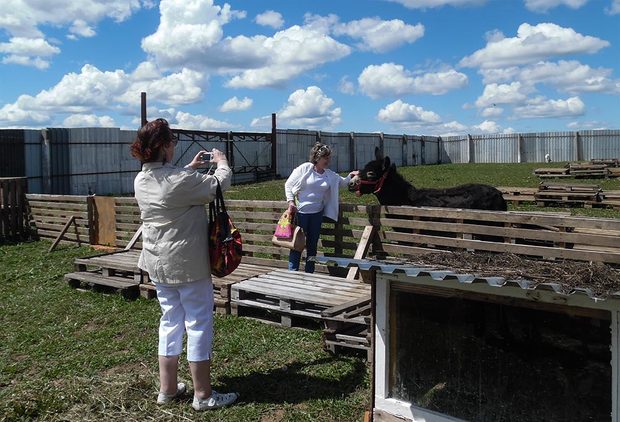To village! Who is promoting ecotourism in Tatarstan
According to the assessments of the Rural Tourism Association of Tatarstan, in 2016 Tatarstan rural areas received about 7,000 tourists. Not so many? Yes. However, this market segment has all chances to develop in an independent industry – to make agrotourism a tool for development of rural areas by efforts of these areas themselves, wish the officials of tourist industry, assessing the potential market at 30 billion rubles a year. Meanwhile, the idea is being advanced by farmers-associates. Some of them have recently been residents of big cities.
The farmers of the region first declared their readiness to receive the visitors on their territory about 15 years ago, it is considered that agrotourism emerged in the same period. However, over ten and a half years, this segment has not developed into an independent industry.
The United Russian Agrotourism Network (rosagrotourism.ru) reports the following: in Tatarstan, there are only four rural rest objects — an eco farm, a manor house, a couple of guest complexes. The base of the Agrotourism Promotion Association of Russia does not contain information about the regional facilities, despite the fact that it is updated since 2006. Though, most likely, the thing is not in the absence of agrotourism but in the absence of a normal, standardised accounting: even the State Committee for Tourism does not have accurate information about this. Deputy Chairman of the Agency Liana Sayetova says that there are 'a few entrepreneurs' who develop agrotourism in Tatarstan. The most famous of them — Gabdelakhat Kotdusov, who, according to the State Committee, received approximately 6,000 tourists last year. An ecofarm Kaensar in Arsky district received two times less, and even this figure is considered to be decent for the farmers.

The Federal Tourism Agency estimates the share of rural tourism in the total tourism market at 2%. Of course, this is not a ceiling: the experience of Europe shows that rural tourism is able to provide from 15 to 30% of the total income to the industry.
The head of the regional Association of rural tourism Rufiya Mukhamadeyeva has more information about how this direction is developing. Now she is the main 'engine' of this segment, market participants admit. According to her, in Tatarstan there are about 60 objects of rural tourism. However, when it comes to the list, it turns out that, in addition to farms, there are featured projects of the provincial museums-reserves, domestic zoos and guest houses. That is, it is what you can more or less pull to the category of 'rural tourism'.
'It does not contradict the generally accepted understanding of the term 'rural tourism' — it involves the use of natural, cultural, historical and other resources of the countryside and its features to create a comprehensive tourism product,' explains Mukhamadeyeva.
They try to surprise the visitors with exotic animals, dishes of the traditional Tatar cuisine, banya, arts & crafts, horseback riding: this is a standard set of features that are offered at the guest house on request 'agro-tourism'. In fact, this coincides with the expectations of potential guests.

Agrotourism is only for romantics
Now Mukhamadeyeva is a kind of mediator between officials and farmers. She tells about the successful experience of their 'colleagues' from the Arkhangelsk region and Belarus: in these regions, tourism helps to diversify rural incomes and, most importantly, to breathe new life into 'dying villages'.
However, good intentions will inevitably face the realities: a pronounced seasonality and a small number of tourists do not allow to turn agrotourism into a large business – all the interlocutors have come to this conclusion. It is hard to imagine that farmers, accustomed to count every ruble, will become hoteliers. They are not willing to take out money from the main turnover for the organization of full-fledged infrastructure according to the requirements of tourism facilities.
A pioneer of rural tourism Gabdelakhat Kotdusov says that it took him 5 years to bring the farm to profitability, and in recent years an ostrich farm even has brought him a small profit. A lot of schoolchildren visited the farm of Kutdusov in Verkhneuslonsky district. The investments in 'project', according to the farmer, amounted to 4 million rubles. Danis Zakirov, a certified lawyer, just a year ago left the city, now a manager together with Adelya Yanysheva, who is also a former citizen with higher education, of of an eco farm Kaensar says that they invested about 20 million rubles (in a dairy farm, construction of guest houses and small tourist infrastructure).

No money. Give us tourists
The introduction of tax preferences could reinforce the intentions of the regional officials to attract tourists to the villages. So it was in Belarus, where the introduction of incentives has allowed to make a real breakthrough.
'Belarusian agro entrepreneurs pay a base tax of $ 10 per year,' says Mukhamadeyeva. 'However, the state power are faced with the need to separate the real farmers working in the hospitality industry from the many wishing to use the exemptions, but not having no relation to agrotourism.'
Tax exemptions exist for farmers in Poland, where the contribution of agrotourism in the GDP of the country is 4%(!). Russian entrepreneurs are also waiting for similar concessions from the state: in August, the participants of the conference dedicated for the development of rural tourism in the Volga Federal district came out with a proposal to exempt from the payment of taxes small and medium-sized businesses of agro-tourism for 3 years, and to proclaim the ten-year holiday from taxation the property of physical persons and newly registered individual entrepreneurs for new type of activity.

The profitability of agrotourism business (the experts say about the potential profitability of 15-30%) could grow significantly through giving the individual status to the agrotourism objects. Now a farmer, trying himself in the agrotourism is, in fact, a hotelier, a producer and shop owner in one person, who is opposed to the regulatory authorities of all of these areas. In this regard, again, it would be appropriate to appeal to the experience of Belarus: there is a person, working in the field of rural tourism, in general, is not an entrepreneur — he's just a private person, receiving guests.
As for getting the funding according to the programme of SMEs support, now it is actually frozen,' says Rufiya Mukhamadeyeva. 'Most support programme due to savings reasons are sequestered. For example, if last year we could count on a grant of the State Committee on tourism for the development of a tourist objest, but this year such expenditure in the budget of the department is not provided. In 2013, it was suspended the funding of the programme 'Social business', carried out by the Agency of Investment Development of RT. However, paradoxically, the sector representatives themselves are reluctant to accept financial assistance from the state. What they really need is the assistance in the promotion of their objects.
'I previously worked in online shop and I can easily do any advertising campaign on the Internet. The problem is that farmers have no advertising budgets,' says Danis Zakirov.
According to Niyaz Latypov, in the recent past of the farmer, and now known in Tatarstan blogger, a farmer, whose main task is the production and sale of agricultural products, is unable to form a stable tourist flow because he does not have neither forces nor time. 'Once I was thinking about the development of agrotourism, but I have buried this idea long time ago,' says Latypov.

However, there is also good news. It seems that local officials are ready to meet halfway the rural devotees in the promotion. They see the development of agrotourism through the incorporation of more or less successful objects into clusters, tourist routes. Something similar can happen in Arsky district, where there is a whole set of positive factors: it is close to Kazan, and several ready-to-receive-tourists objects (village of Khotnya, a farm Kaensar, the complex Kyrlay), and an interesting legend for tourists – the residence of Kysh Babay.
As for travel agencies, they will be ready to sell these routes as soon as a product appear. Meanwhile, in Kazan there are only two agencies, which I can say, are interested in this topic very much. One of them is the Travel and Work agency, which initiated the project 'The Residence of Kysh Babay' in the village of Yana Kyrlay, having received a development grant under the program 'Social business'.
'It should be admitted, many farmers do not understand who could be interested in their culture and their history,' regrets Mukhamadeyeva from the regional Associations of rural tourism. 'But I believe that everything that has been done does not go away like water into sand. Our efforts are not in vain and the theme will still 'shoot' — in five-ten years. The trend for eco-friendliness, the desire to escape from the city is strong, and there are farmers who intuitively sensed the trend 13-15 years ago, when there was no question about the possibility of state support, a formation of the segment into an independent industry, etc.,' said the expert.
Danis Zakirov supported her:
'We see that this year a good work on the development of agrotourism has been started. We're glad that the work is going in slow pace — this will give an opportunity to bring really good projects in agrotourism.'